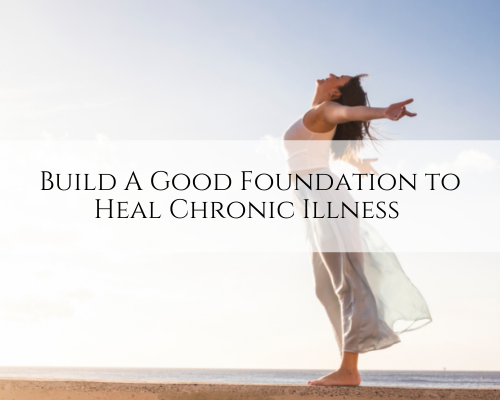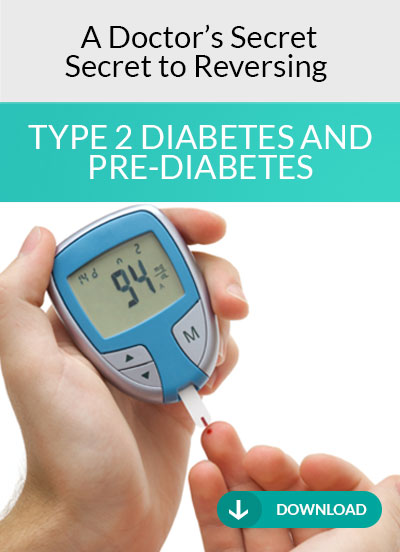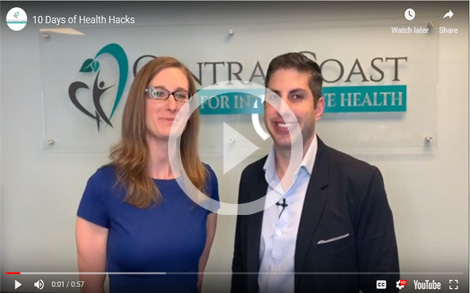What are the key foundational aspects that need to be in place for healing? It may seem overwhelming at first, but if you become aware of your stressors, stop feeling helpless or hopeless about where you are on the journey, and find the positive support you need, you are building the foundation you need to heal.
A Vicious Cycle of Feeling Helpless and Hopeless
After being diagnosed with a serious health condition or disease, you may feel like you have lost control of your health. You may start focusing on what you can’t do or where you can’t go. It may become hard to motivate yourself to make positive changes. You may think is a diagnosis that you will have for the rest of your life. It might feel like forever. You may feel like a victim that has no control over anything anymore.
Over time you may get used to feeling this way. It may dictate a large portion of your life. Your disease seems like it decides how you feel, act, or what you are capable of. This mentality eventually seeps into a feeling of constant helplessness and hopelessness that creates a perception and reinforces that you have no control – that you are merely a victim of your health condition.
Understandably, people experience this when facing serious or chronic health challenges. However, there is a better way, and all it takes is a few steps. One foot in front of the other. Don’t let one diagnosis be your undoing. Change the way you approach these struggles. Gather the resources you need. Take time for your health. You can make space for healing and build a foundation that allows you to take control of your illness and turn it around.
How Chronic Illness Can Affect Your Wellbeing
Chronic illness can make your daily life a struggle, affect your coping skills, cause pain and fatigue that wears you down, and physical changes associated with your condition may lead to a poor self-image or lack of confidence. Over time you may withdraw from social activities, distance yourself from friends, or suffer from depression and anxiety. Stress can become unbearable, leading to frustration, hopelessness, anger, and sadness.
Stress symptoms include:
- Anxiety and sadness
- Headaches
- Irritability
- Loss of interest in enjoyable activities
- Pain and body aches
- Sleep disturbances
The Steps to Healing
The reality is, you are in charge of your healing. Most people with chronic illness are in control of their health, and their healing journey is their own. Your daily decisions, habits, and lifestyle choices impact wellness and can dramatically improve your quality of life. That is why a good foundation is so critical to launching you on your healing path.
Step 1 – Empowerment
The first step is to stop and look inward. See this challenge from a different angle, with fresh eyes, or a new mindset. It will be hard initially to find the hope and motivation to do something different. You can begin by doing a few of these:
- Listen to others that inspire you – this could be someone struggling with the same health condition or chronic disease you are, someone who makes you feel hopeful and strong, or a podcast about a positive mindset that helps you reprogram your negative thoughts.
- Educate yourself – learning everything you can about your diagnosis is crucial to care. It is best when a person drives education and learns what this illness means to his or her everyday life. Some of the ways to educate yourself are to understand the seriousness of your condition. For example, diabetes is a serious disease. Changes need to be made, or your health will suffer greatly. You are the most essential part of healing and managing your illness. It comes down to your decisions each day and whether they will be positive for your health or contribute to your decline. Learn about the options you have to manage your disease. Standard medical treatments are often limited to treating the symptoms, whereas functional medicine treatments which address root causes can give good results even for difficult to treat conditions.
- You are in control – it may be hard to see at first, but you are ultimately in control of how you react to your diagnosis. You may feel change is impossible, but a change of behavior is always attainable by setting goals and taking tiny steps to achieve those goals.
- Find the right support – whether in person or online, positive support is a crucial part of the healing process and will help you stay accountable and motivated to achieving your goals. Research shows the link between social relationships and better health. With a variety of positive relationships, people fare better, they have less cognitive decline, improved mental health, and they can cope with chronic illnesses. We talk about the power of positive support in this blog.
- Say no to negativity and toxic relationships – Finding motivation and an optimistic outlook is hard work. Allowing people to be around you that unintentionally sabotage you, are constantly negative around you, or toxic to your wellbeing are not helpful to have around. It is better to reduce or eliminate these people from your life while navigating your new normal.
- A positive mindset and positive support go a long way. According to Dr. Shilagh Mirgain, positive social support is crucial to wellness, “Having strong, positive social support is one of the most important factors in predicting the physical health and wellbeing in people of all ages,” explains Mirgain. “It can help us cope effectively with stress and even help strengthen our immune system and lower our risk of disease.”
Step 2 – Take Action
The best action step to take after being diagnosed with a chronic illness is to stop and think about how you can overcome it by making positive changes.
It can look like this:
- Exercise – movement can help reduce physical pain and swelling by increasing circulation in the body and flushing out joints.
- Functional labs – oftentimes a further investigation is needed after a diagnosis to pinpoint what needs to change and what may be the root cause.
- Work with someone – to gain awareness and knowledge about your health condition, in addition to your primary doctor or healthcare professional. Seeking out a functional medicine doctor, for instance, can give you a whole new perspective and understanding of your chronic illness.
- Listen to your body – this is perhaps the most essential part of this journey. When you have symptoms, your body is trying to tell you something. By listening to your symptoms, i.e., brain fog, joint swelling, or bloating and diarrhea – you and your functional medicine practitioner can begin to link your symptoms to parts of your illness that can be changed.
Step 3 – Stress Management
Stress kills. And it can make us very sick. After coming to terms with a chronic illness diagnosis, take a long hard look at the things that cause you stress. It could be a relationship, a job, a responsibility you need to let go of, a food, or a bad habit. Identify and remove both physical and emotional stressors to help your body begin to heal. Positive thinking also plays a role here since it reduces stress and negative thinking.
Physical, mental, and emotional stressors
Physical stressors like physical pain and inflammation can be reduced by being more active. Mental and emotional stressors can be remedied with a wide range of approaches, including:
- Deep breathing
- Journaling
- Meditation
- Mindfulness
Is food the root cause?
An elimination diet can help you figure out if your stressors are foods. Food sensitivities can trigger illness or cause blood sugar issues. Paying attention to your food is an integral part of healing and self-care. Food allergies or sensitivities can be the culprit of many symptoms, including fatigue, brain fog, irritable bowel syndrome, migraines, and more.
Foods commonly associated with symptoms include dairy, wheat, eggs, corn, citrus fruits, peanuts, nuts, seafood, coffee, sugar, yeast, soy, and some meats like pork or beef.
Pay attention to lifestyle and habits
Practicing mindfulness when it comes to your body and being aware of stressors, triggers, and sensitivities can help you learn how to better care for your body.
Chart a New Course for Your Chronic Illness
Being diagnosed with a chronic illness can be scary and create an unknown path you never considered before. It is normal to feel overwhelmed, frustrated, angry, or sad. However, you are in the driver’s seat. Empowering yourself to change, adopting a positive mindset, gathering positive support, educating yourself, managing stress, and taking action can help you navigate the stormy sea and turn the tide on illness.
Schedule your free Discovery Consultation with the Caplans. Virtual consultations are also available. We can help you pinpoint and address root causes of chronic illness so you can start feeling like your old self again.
Board Certified in Integrative Medicine
Certified Functional Medicine Practitioner
Institute for Functional Medicine Certified Practitioner






